Monica Saigal Bhide's Blog, page 6
April 26, 2016
Roshni Media’s “Global And Emerging Leaders”
I am so delighted to share that I have been selected to be included in Roshni Media’s terrific new book featuring Global And Emerging Leaders. Their core vision & mission is creating global diversity awareness. It is a great privilege to be featured alongside people I admire greatly like Chitra Banerjee Divakaruni and Deepak Chopra!
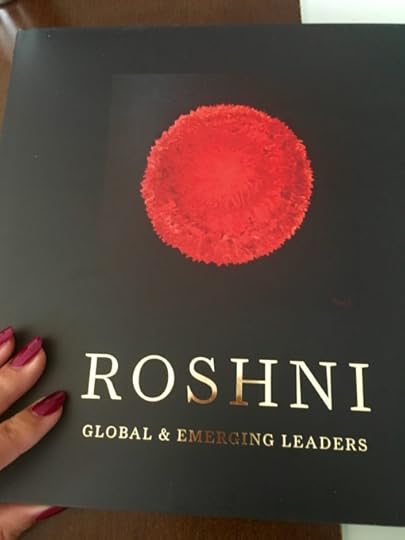
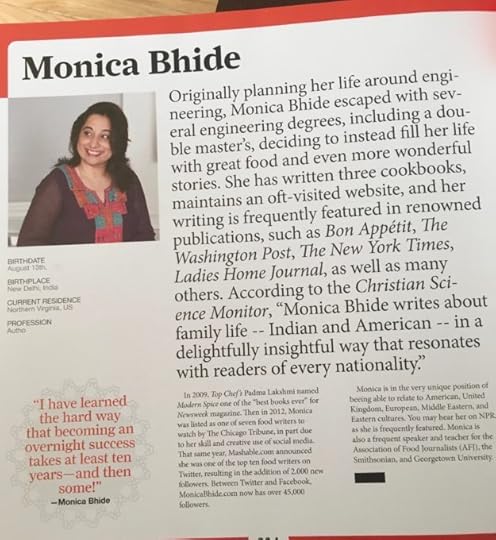
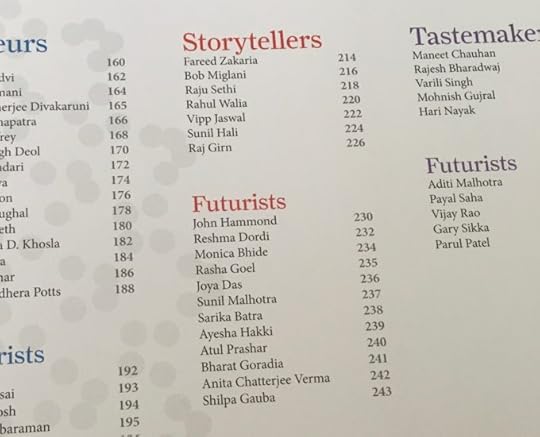
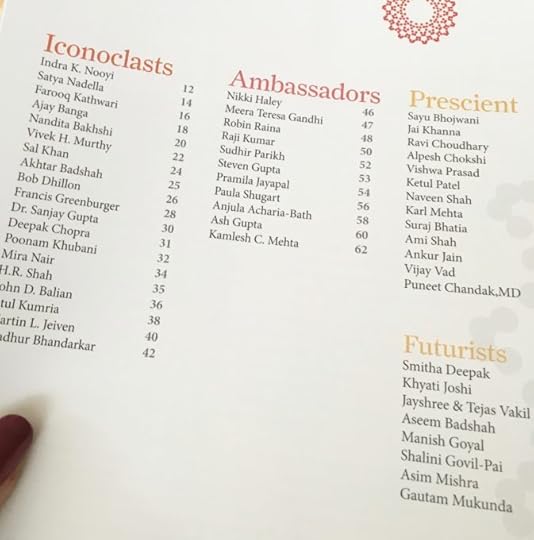
The post Roshni Media’s “Global And Emerging Leaders” appeared first on Monica Bhide | Recipes, Stories, Inspiration.
April 19, 2016
How to Do It All: The Revolutionary Plan to Create a Full, Meaningful Life

First – I have to tell you how much I love the title of this book: How to Do It All: The Revolutionary Plan to Create a Full, Meaningful Life -While Only Occasionally Wanting to Poke Your Eyes Out With a Sharpie. I giggled when I read it and it had the effect that the author, the super talented Linda Formichelli. wanted – I immediately wanted to buy the book!! According to Linda, this book has an important message: “Despite the cultural narrative that “women should’t try to be superwoman,” we CAN do everything we want in our lives, whether it’s to volunteer, have hobbies, learn new skills, entertain, compete in athletic events, start a side business, write, start a spiritual practice, and more. Sure, it can be stressful — but what meaningful activity is ever 100% stress free?” And I agree with her!
I found the book very interesting and wrote to Linda asking permission to share an excerpt with you all here. I hope you will enjoy it:
Reprinted here with permission from author:
Change the Way You Talk
A downfall many women have is that we really want to go all-out toward our D-I-A Desires, but we feel demotivated, uninspired, stuck, sad, angry, overwhelmed, or just plain blah. We get upset that our goals aren’t happening as quickly as we’d like, or we’re anxious because doing it all can be uncomfortable at times—and who likes to be uncomfortable?
One solution is to shake up your dialog. The words you choose when you talk to yourself, and to others, have a huge impact on how you feel and act. If you think or talk about your D-I-A Plan using negative, weak, or sad-sounding words, the Plan will feel like a downer as well, instead of your ticket out of boredom, lethargy, and passivity.
Here are several language-based strategies that can help you go from ugh to yay!
Think And Instead of Or
We often feel like we’re being torn in two: Do I make good money or work a job I love? Do I work a job I love or stay at home with the kids? I have time to train for a 5k or volunteer, but not both. I have the money to create a home I love or travel.
Here’s a mind shift I read about in the newsletter of Chip and Dan Heath, authors of Made to Stick: Why Some Ideas Survive and Others Die: “Always try to think AND not OR. Can you avoid choosing among your options and try several at once? For instance, if you’re deciding whether to invest time in Spanish lessons or ballroom dancing classes, do both for a while until one of them wins. Or, rather than hire one employee out of three candidates, could you give all three a 2-week consulting project so that you can compare their work on a real-world assignment?”
When you change or to and, you get options like this:
I plan to find a job that I love and that pays well.
I’ll look for a job that will let me telecommute, and I can stay at home with the kids.
What if I volunteered to do setup for a charity race? Then I could volunteer and train!
I’m looking for a hobby that combines my love of foreign languages and How about offering to teach a painting class at the Chinese Community Center?
I want to travel and save the money to create the kitchen of my dreams. Let me look at our budget to see what expenses we can cut, and also explore travel hacks for scoring cheap airfare.
You get the idea: Using the word and instead of or opens up possibilities in your life that you may never have considered before, and that can help make your D-I-A Plan a reality.
Think And Instead of But
What’s the difference? The word but shuts down any hope for a solution, and gives you an easy out when it comes to your D-I-A Goals. Replace but with and, and suddenly you’re open to brainstorming new options. For example:
“I want to become well-read, but I don’t have money for books.” Do you hear the It is what it is here?
“I want to become well-read, and I don’t have money for books.” Now your mind automatically goes on to ask, “So what can I do? Maybe I can go to the library, borrow books from a friend, download free public-domain classic novels, or join a book swap!”
I’d say you should try this tactic, but then I’d have to contradict myself with…
Do or Do Not. There is No Try.
When you tell yourself or others that you’ll try to do something, here’s what you’re really saying: “I have no confidence I can accomplish this goal, or I don’t want to do it but don’t know how to say no.” Consider these two statements to your running group leader:
“I’ll try to make it to the running group today to train for my 5k.”
“I’ll see you at the running group today to train for my 5k.”
See the difference? In the first sentence, you’re conveniently leaving yourself an out: “Well, I said I’d try, but something else came up. Sorry!” Yoda had it right: Say you’re going to do something, and then do it.
Instead of Saying I Have to or I Should, Say I’m Going to or I Get To
You’re talking with your best gal pal about your current D-I-A Desire and are about to say, “This morning I have to meditate,” or “I really should find somewhere to volunteer today.” Instead say, “This morning I get to meditate!” Or, “I’m going to find somewhere to volunteer today!” Do you feel the difference?
Though it will take repeated efforts, you can do the same in your own head. When you catch yourself thinking, “Ugh, I have to work on the website for my side gig today,” grab yourself by the gray matter, shake it around a little, and tell yourself instead, “Today I get to work on the website for my new side gig! Yippee!”
This isn’t really a mind trick, because it’s totally true. You’re alive! You’re in the envied position of being able to meditate, start a new business, and volunteer. You get to do all these things. You are so lucky!
Rename Your Tasks
This idea comes from the book Level Up Your Life: How to Unlock Adventure and Happiness by Becoming the Hero of Your Own Story by Steve Kamb: Instead of calling the to-dos on your list tasks, call them something that makes them sound way more exciting, like mini-quests or adventures. Remember, everything on your to-do list should be there to further your D-I-A Desires, make you happy, and improve your life!
Minimize Your Emotional Language
And this idea I borrowed from Tony Robbins: Whenever you feel a strong negative emotion bubbling to the surface of your consciousness, tone down the words you use to describe it. In fact, tone them way down.
For example, instead of saying you’re extremely overwhelmed at everything you want to do for your D-I-A Plan, tell yourself, “I’m feeling just a tad nervous.” If you’re furious that your Plan isn’t going as well as you’d hoped, say, “I’m slightly annoyed that the competition I trained for was cancelled.” Devastated that your partner isn’t showing you the support you were hoping for? Say, “I’m a little disappointed my partner isn’t as excited about my D-I-A Plan as I am.”
Along the same lines, a trick I learned long ago is to replace the words nervous, anxious, or stressed (and anything related to them) with excited. So now you’re excited about that speaking engagement, not petrified. And you’re not stressed about that upcoming certification exam…you’re excited!
Toning down your emotional words defuses the emotions attached with them, as well. And sometimes it even makes you laugh, defusing the emotions even more: Imagine the chuckle you’ll get out of the understatement I’m a tad annoyed when you’re really in Sharpie-poking mode.
Words have power, and the way you talk to yourself and others can boost your motivation—or destroy it. Try these tricky strategies for changing up your language, and you’ll feel empowered, inspired, and excited to go after your D-I-A Desires.

The post How to Do It All: The Revolutionary Plan to Create a Full, Meaningful Life appeared first on Monica Bhide | Recipes, Stories, Inspiration.
April 17, 2016
A Q&A with Chitra Banerjee Divakaruni
I have a girl crush on Chitra Banerjee Divakaruni. Her book, The Mistress of Spices, continues to be one of my top favorite book of all times. Her work just keeps getting better and better. She is a brilliant writer who has the uncommon talent of poetic prose and purpose combined. While the books of many writers live on my shelf, her work lives in my heart.
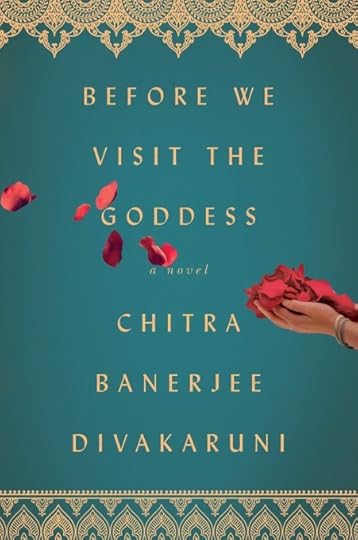
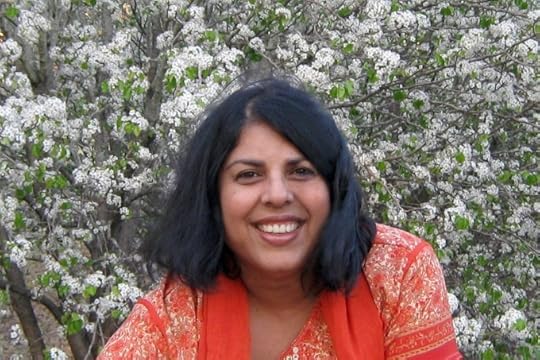
Chitra has a marvelous new book out today, Before we visit the Goddess, and I am honored to share this QA with you.
What is Before We Visit the Goddess about?
It is a novel in a unique form, a novel-in-stories, about the lives of three generations of mothers and daughters who must discover their greatest source of strength in one another. It follows the adventures of each of the three women – Sabitri the grandmother, Bela the daughter, and Tara the granddaughter – as they try to each come up with an answer to the question, What makes a woman successful? What makes a woman happy?
Here’s some more about the book: The daughter of a poor sweetmaker in rural Bengal, India, Sabitri yearns to get an education, but her family’s situation means college is an impossible dream. Then an influential woman from Kolkata takes Sabitri under her wing, but her generosity soon proves dangerous after the girl makes a single, unforgiveable misstep. Years later, Sabitri’s own daughter, Bela, haunted by her mother’s choices, flees abroad with her political refugee lover—but the America she finds is vastly different from the country she’d imagined. As the marriage crumbles and Bela is forced to forge her own path, she unwittingly imprints her own child, Tara, with indelible lessons about freedom, heartbreak, and loyalty that will take a lifetime to unravel.
What is the setting of this book?
Like many of my books, it spans two countries, moving from India to the United States. This book is also interesting because it follows my own life’s trajectory, beginning in a small village in Bengal (very similar to my ancestral village), spending some time in California, and ending in Texas, where I now live. However, it is not autobiographical in any other way!
Is this your first interlinked story collection? Did the process differ from writing a ‘regular’ collection? Or a straightforward novel?
This is my first novel-in-stories. It was very different and more liberating than writing an actual novel because I felt I could make leaps whenever I needed to. I did have to think carefully about who would tell each of the stories, but I had the liberty to bring in new speakers when I felt it was called for. Thus there are several male narrators in this book.
That was one of my favorite parts of the book – intermingling male and female narrative voices.
This format allows for a closer connection between the stories than in a collection. Also, there is a definite narrative arc. I knew my beginning and end points, though I had to organically figure out how to get from the beginning to the end.
ORDER NOW – Before we visit the Goddess
Are there challenges to writing about life in India for you, now that you live in America? And how do you address these?
It’s a great challenge to write about a place in which one is not living now. I need to research changes and observe very carefully when I visit. It is particularly a challenge because India has changed so exponentially. I need to read literature about contemporary India. I need to try and feel the pulse of how people are thinking – that’s the toughest. I talk a lot to Indians before I write my books, and I have a few trusted Indian readers to whom I give the books for fact and atmosphere checking.
Food is a big part of this book, and of several of your other books. Why is this?
In Before We Visit the Goddess, food plays an integral part. Two of the women in this book make their living from cooking – but in very different ways. The third – the granddaughter – feels the pressure to be a good cook, but finds her own relationship with food, particularly Indian food. I think I gravitate to writing about food because I like food and am interested in cooking – although I’m the kind of cook who likes shortcuts! – but also because I see that food is so symbolic for immigrants. It is something of their own that they can carry with them across the world. It gives them comfort in the midst of change and unfamiliarity. Food is also how they often pass on culture and life lessons to the next generation. All of this is woven into this novel.
What are some foods that play a part in this book?
Three foods that play an important role in these stories are
Chocolate Sandesh, which used to be one of my favorite desserts when I lived in Kolkata, and which is the daughter Bela’s favorite dessert.
Pakoras, which my mother used to make for us on rainy days, and which one of the characters asks his mother to make for him on a rainy day!
Bengali pumpkin Curry, which the granddaughter will make with great difficulty in one of the stories, modifying her mother’s elaborate recipe. This is a dish that I grew up with and love, but it’s quite could time-consuming to make.
Order now: Before we visit the Goddess
The post A Q&A with Chitra Banerjee Divakaruni appeared first on Monica Bhide | Recipes, Stories, Inspiration.
April 15, 2016
Life Without A Recipe: A Memoir About Food And Family
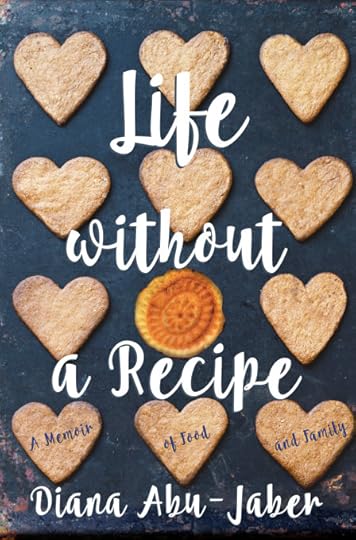
ORDER NOW: Life Without A Recipe by Diana Abu-Jaber
Diana Abu-Jaber is my hero when it comes to writing about food! Whether I am lost in her Birds of Paradise prose or marveling her adventures in The Language of Baklava, the one thing I know for sure is this — she is a marvelous and engaging storyteller.
I am delighted to share a brief QA with Diana about her wonderful new book – Life Without A Recipe: A Memoir About Food And Family
But before the QA, I feel compelled to share my reading experience with this book. I began to read the book and expected to finish it in a couple of days. I was so wrong. This is NOT a book you want to read in one sitting. This book is meant to be savored. It made me stop and reflect so many times. In fact, I was reminded of an interesting incident that happened when I was visiting Paris a few years ago. I was out with a group exploring Paris. It was mid-day and we were all tired. Our guide suggested we get some coffee. It sounded like a great idea so we asked where we could get coffee to go. She laughed and said, “Americans use coffee to keep going, here we drink coffee to slow us down. We will go to lovely cafe, get coffee, get some cake and sit down and relax.” THIS sentiment perfectly describes how Diana’s book should be read: Take it with you, sit down with your beverage of choice and get ready to be transported!!
ORDER NOW: Life Without A Recipe by Diana Abu-Jaber
QA with Diana Abu-Jaber
You talk a lot about growing up surrounded by food. What role does traditional Arab food play within your family?
In my family, food was so much more than nourishment. Cooking was my immigrant father’s highest expression of self—it gave him a way to speak when he wasn’t totally comfortable in English and felt out of place in his new world.
It was also his “vehicle,” the conveyor of memory and culture, his most immediate, physical, personal way of sharing his past and his homeland with his children—a kind of delicious interpretation of homesickness. The better it tasted, the more he missed home. The table did double-duty in our house because while we ate, Dad told us stories about growing up in Jordan. So we were able to learn about our heritage through both the ingredients and preparations as well as through his memories.
What’s your favorite family recipe?
For sheer deliciousness, I might pick the garlic-stuffed roast leg of lamb. But the grilled lamb shish kabob wins overall because of its ceremony. From watching my father carve and marinate the lamb to the first squirt of lighter fluid into the grill, there was a ritual to making shish kabobs that never varied and was deeply reassuring. It usually meant eating outside with friends, waves of sizzling meats and vegetables fresh off the grill, and staying up past bedtime: all of it irresistible.
In Life Without a Recipe, we read about a number of your encounters with different cultures and languages, either within your own family or through your travels, both near and far. How have these experiences influenced your approach to writing and self-expression? Will you try to replicate these multicultural encounters for Gracie?
There’s a unique richness to travel and cultural exploration, and I think that’s especially important for American writers and readers—we can get a bit insular on our little continent. Part of my own impulse to travel is also about maintaining a connection to my father’s home country of Jordan and to the Middle Eastern people.
But there’s also the simple reality that, while you think you might be traveling to experience art or history or new landscapes, every time you voyage out, you learn about people. That brings a new texture and depth to writing—a sense of emotional complexity that can’t be faked.
Gracie is already a great traveler. Every year she flies with us from Florida to Oregon when I go to teach the fall term in Portland. We’ve taken her to Canada and the Caribbean, and I can’t wait to take her to Jordan. I think travel is one of the most nourishing things you can do for a child’s mind and imagination, as well as their emotional and social intelligence.
ORDER NOW: Life Without A Recipe by Diana Abu-Jaber
Your previous books The Language of Baklava and Crescent are inspired by your Arab-American identity, while this new book seems more focused on exploring your identity as both a wife and a mother. Can you elaborate on this shift?
My father’s culture will always be a big part of me, but in Life Without a Recipe, I’m finally moving away from early years, trying to trace the way adult life gets more complex and identity grows richer. Even though it’s a memoir, it’s very much about leaping out of the bounds of the past. This book considers what it feels like to take on dramatically new identities throughout adulthood—what a fascinating, creative, ongoing project life is.
That’s what excites me about exploring a more holistic American self—this country contains so many possibilities, so many disparate tribes and stories, it’s a nation that in many ways is predicated on exploration and discovery. I feel like my Arab heritage—as well as my Grandmother’s German background—both have a place here and that I’m free to incorporate these as well as create my own sense of identity.
Diana Abu-Jaber / LIFE WITHOUT A RECIPE:
JORDANIAN EGGS
You can make these eggs in a snap. Good for lunch or dinner too, they’re quick and full of flavor. Use the ripest tomatoes available.
Serves 2-4
4 large eggs
2 garlic cloves, well mashed
1/2 teaspoon red-pepper flakes
1/2 teaspoon cumin
1/2 teaspoon sumac
3Tablespoons olive oil
1 ripe chopped tomato
Optional: grated parmesan cheese.
Stir mashed garlic with some salt, pepper, red-pepper flakes and the oil in a small bowl. Heat frying pan over medium heat then pour in the oil mix and heat for a minute.
Stir in the garlic mixture and tomato and fry for a minute or two—don’t let garlic get too brown.
Crack eggs into a small bowl then add to pan and fry—you can break the yolks and let them swirl into the white like Bud does, or just let the yolks set in place. Just before done, you can sprinkle some parmesan cheese over the top.
Great served with warm pita or baguette, oil-cured black olives
(Recipe used with permission from author)
ORDER NOW: Life Without A Recipe by Diana Abu-Jaber
PS – Her book tour begins on April 19th. For upcoming readings, please check out the events pages on her website.
The post Life Without A Recipe: A Memoir About Food And Family appeared first on Monica Bhide | Recipes, Stories, Inspiration.
March 31, 2016
The Right Ingredients for a Winning Cookbook- The Smithsonian Associates
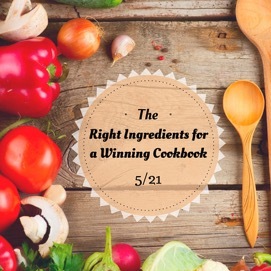
ou want to document your family’s recipes, or help your church collect recipes from the congregation, or create a showcase for your own restaurant’s dishes, but you’re not sure how to begin. Cookbook author and writer Monica Bhide provides the ingredients for a good cookbook—and suggestions for starting to write one. She focuses on the main steps, from collecting recipes and developing your own, to writing tempting recipe backstories and compiling a cookbook. The last step, of course, is how to tempt people to buy your book when it’s done.
9:30 to 10:45 a.m. The Vast World of Cookbooks
The many varieties of cookbooks: restaurant, single-ingredients, fund-raising, and personal cookbooks, among others. What a good cookbook includes, from recipes, stories, and history to tips and technique sections.
11 a.m. to 12:15 p.m. The Nuts and Bolts
The art of writing recipes. Testing recipes, and why head-notes can make or break a recipe. Finding a good food photographer or how to take your own photos. Free or fee-based stock photography and where to find it.
12:15 to 1:30 p.m. Lunch (participants provide their own)
1:30 to 2:45 p.m. Publishing Your Cookbook
The pros and cons of self-publishing versus traditional publishing. How to write proposals and find agents. Cookbook editors: Why we need them and what they do.
3 to 4:30 p.m. A Discussion with the Experts
In a question-and-answer session, noted cookbook authors share insights and experiences, and discuss the practical considerations, challenges, and components of cookbook writing.
The panelists are: Joan Nathan, award-winning cookbook author and frequent New York Timescontributor; Domenica Marchetti, cookbook author and contributor to the Washington Post, Fine Cooking, and Food and Wine; Nevin Martell, food, travel, and lifestyle writer and author of The Founding Farmers Cookbook and It’s So Good: 100 Real Food Recipes for Kids; Bonnie Benwick, Washington Post food section deputy editor and writer of the “Dinner in Minutes” column and cookbook reviews.
Bhide has written for the Washington Post, New York Times, Food & Wine, Savuer, Bon Appetit, and many other magazines and newspapers. She is a frequent guest on NPR.
Location –
S. Dillon Ripley Center
1100 Jefferson Dr SW
Metro: Smithsonian (Mall exit)
The post The Right Ingredients for a Winning Cookbook- The Smithsonian Associates appeared first on Monica Bhide | Recipes, Stories, Inspiration.
March 29, 2016
Heartwarming review in Edible Idaho
I am so very honored that writer Linda Whittig loved “A Life of Spice” and wrote such a superb review in the current issue of Edible Idaho.
“Bhide’s stories are steeped in culture and wrapped in descriptions that beg for the cardamom and saffron to be pulled out of the spice drawer or at least a reservation made at a local Indian restaurant.” — Linda Whittig, Edible Idaho.
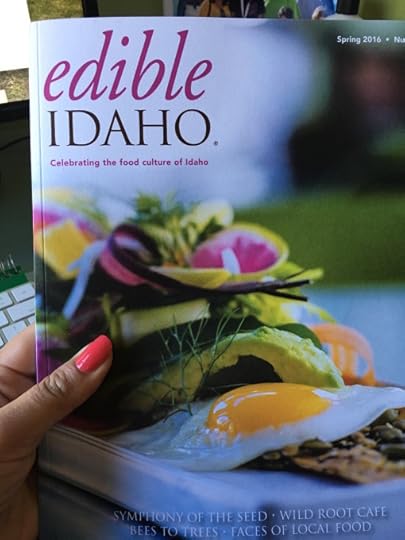
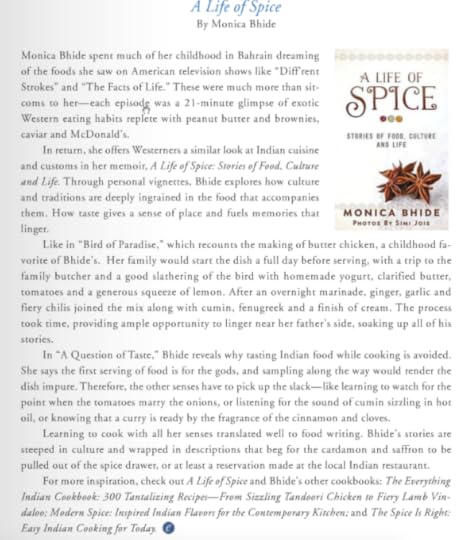
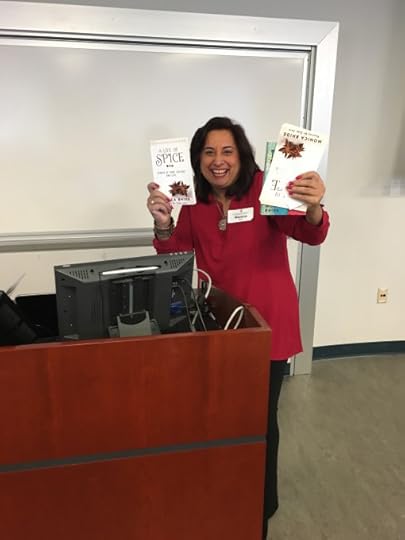
The post Heartwarming review in Edible Idaho appeared first on Monica Bhide | Recipes, Stories, Inspiration.
March 18, 2016
Can a conference change your life?
Almost eleven years ago, I decided to quit my six-figure consulting job and start a new life: I wanted to be a writer. I had no qualifications, no degrees, no contacts. I could tell a pitch letter from a paper filled with gibberish. In fact, I had pretty much NO idea what to do or how to do it.
Then, there was a miracle of sorts. An essay I had written for eGullet (a site where food lovers gathered), was picked up for a scholarship.
It was 2004 and my essay earned me a “Susan B. Langhorne Novice Writer Scholarship” offered by the legendary Symposium for Professional Food Writers at the Greenbrier.
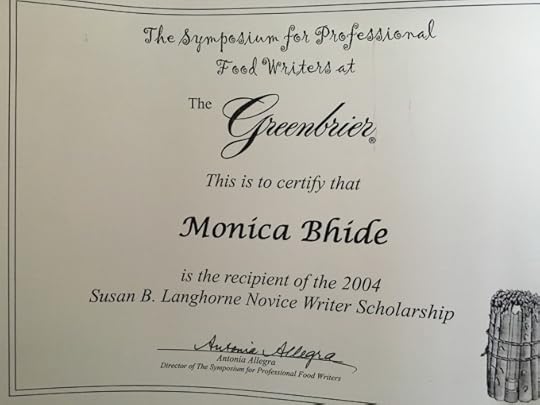
Scholarship in hand, I went to the seminar. I met food editors, writers, authors – all who not only became my friends but also my mentors and guides. That one scholarship gave me the direction, the boost and the help I needed to move forward.
I attended a few conference there after that and each time, I walked away with knowledge, contacts and contracts!
Today, I am so honored to announce that the conference is back and that I am on their board of advisors along with so many luminaries. I am not sure I am deserving of this huge honor but I do know one thing- I am very, very grateful for it
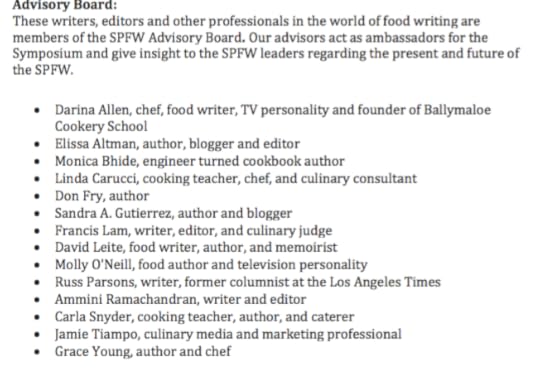
The newly updated conference is now open for registration. You can register now to get their early bird discount.
Here is some more information:

The post Can a conference change your life? appeared first on Monica Bhide | Recipes, Stories, Inspiration.
March 16, 2016
Who should define us?
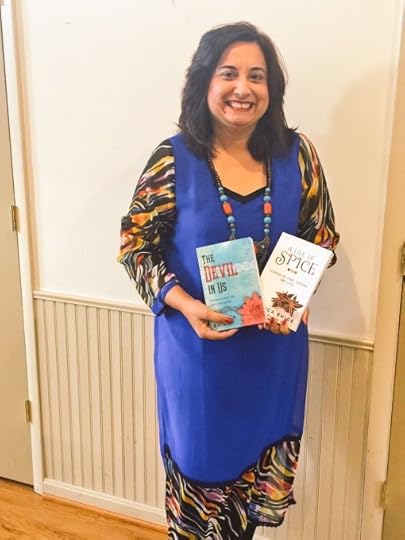
(This appeared on Writers Unboxed in 2015)
Last week, I made a rather harsh decision. I decided to quit writing. Forever.
To know how hard this decision was for me, consider this: all I have wanted to do is write stories. But sharing stories, in my culture, is the equivalent of being perpetually unemployable. My parents were totally against my decision to become a writer. So instead I earned myself an engineering degree with two masters in technology. And found myself employed with a six-figure job for over a decade. But the calling to write was too strong and in the end it won out. I became a writer, a food writer to be more specific. For ten years, I wrote books, articles for national and international magazines and newspapers, and commentaries; got nominated for some awards; and even managed to get a syndicated column. I thought I had it made.
Until last week, that is.
You see, I met with a group of real writers. You know the ones, who in my arena at least, went to cooking school, slaved for years in restaurant kitchens to pay for going to a top-of-the-line journalism school, started out in journalism by sorting mail and eventually grew into editors, reporters, award-winning writers. As I heard them speak about their experiences, I felt myself shrinking in size. Their chat made me realize my biggest fear: my writing could never ever be as rich as theirs for I lacked the credentials they had. I thought I was a writer but after listening to them, I realized that I had no credentials to be a writer. I have never gone to culinary school, I have never stepped into the building of a journalism school much less taken a college-level writing class.
I was what they were referring to as a fraud.
I walked home that night with a heavy heart. Here I was, over forty, should I consider going to cooking school? I already had several degrees that were “worth” several hundred thousand dollars, but they were totally worthless. Then I thought perhaps I should go and learn to write. I sat on the steps to my townhouse and did something I haven’t done since high school. I wept. I don’t know how long I was there but probably for several hours.
When I got up to go into the house, I had made a decision. I was not going to write anymore. I couldn’t.
The next morning, I stared at my computer. I had deadlines to meet, assignments that were due. I simply walked away. I could not bring myself to sit down and write anything. The inner critic had won. I had tuned in to his channel and bought his words hook, line, and sinker.
As the week progressed, I began to grow restless. I attributed it to lack of exercise and focus. I began to send my old engineering resumes to make sure I could get something that looked and sounded like a real job to pay the bills. It made me even more restless.
Then, last night, I sat down and wrote in my diary. I wrote like I have never written before. I wrote and wrote and wrote some more. As the words flowed, the restlessness began to disappear. As I filled the pages, my spirit lifted. As I searched for a different pen when I ran out of ink, I felt elated. The more I wrote, the freer I felt.
I realized what I had forgotten in listening to the real writers and more so to my inner critic: true passion isn’t about the end product of getting a byline. True passion is and will always be about the love of the process itself.
I subscribe to a newsletter called Letters from the Universe, and this popped into my e-mailbox. “The path to enlightenment is not a path at all, Monica, it’s actually a metaphor for the time it takes for you to allow yourself to be happy with who you already are, where you’re already at, and what you already have—no matter what.”
So who am I? I am Monica Bhide and I am, on most days, a writer.
The post Who should define us? appeared first on Monica Bhide | Recipes, Stories, Inspiration.
March 10, 2016
Women in Food – Interview in the Christian Science Monitor
The very lovely – Patricia Tanumihardja, Pickles and Tea interviewed me today for the Christian Science Monitor:
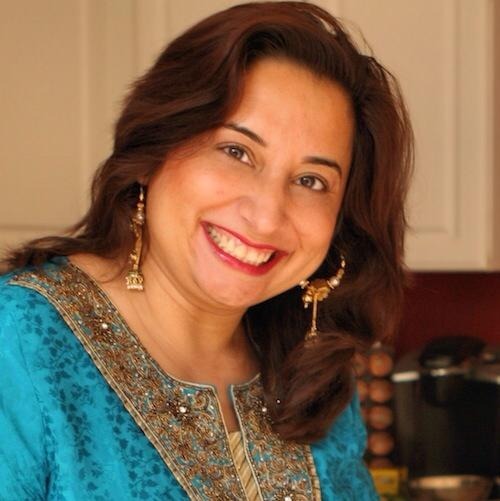
Q. In “A Life of Spice,” there are chapters titled “Food and Culture” and “Food and Identity.” You were born in India and raised in Bahrain, and now live in the United States. I’m sure your culture, childhood environment, and where you live now have played a huge part in influencing your writing. Has this multicultural background shaped you into the writer and person you are today? What’s your response when people ask you, “Where are you from?”
Answer: I like to consider myself a global citizen – India is my soul, Bahrain is my heart and my spirit is the US!
Read the rest of the interview here.
You can check out my books — HERE
The post Women in Food – Interview in the Christian Science Monitor appeared first on Monica Bhide | Recipes, Stories, Inspiration.
March 8, 2016
Should I follow my dreams?

I receive so many letters from readers asking how they can follow their dreams. While the questions/situations vary, here are the two things that are fairly consistent:
1. Most are women
2. Almost all are looking for “someone” to grant them permission to follow their dreams.
I recognize and empathize with that. I have been there and lived in that dark space for a long time.
Here is what I have learned and continue to learn:
1. No one can give us permission to follow our dreams. If the dream truly is your hearts desire, you will follow it. If it’s just a passing fancy that isn’t keeping you up at night, you won’t.
2. The biggest limits we place on our dreams come from us. No one can limit us if we don’t let them. This is the hardest learned lesson in my life.
3. No one can give us the strength to move forward towards a dream. They can be by our side, encourage us, love us, support us. But the path is ours to walk on – the good, the bad, the ugly. It is all ours.
4. The critics, the naysayers only have as much power as we give them. This lesson nearly destroyed me –when a highly visible editor gave me some seriously nasty feedback about my work – I took his words really seriously. His feedback was valid. What I needed to do was use it, fix my work and move forward. Instead, I took his words as law. I began to doubt everything I wrote. I gave him my power.
5. Don’t believe all that you read on social media. People are people and with that comes exaggeration, lies and nonsense.
So now — when you write and ask me if you are should follow your dreams, I say this – I cannot tell you what to do but there is a power that can: The Universe is giving you back YOUR POWER. The Universe is granting you permission.
Now – my question to you — what are you going to do with it?
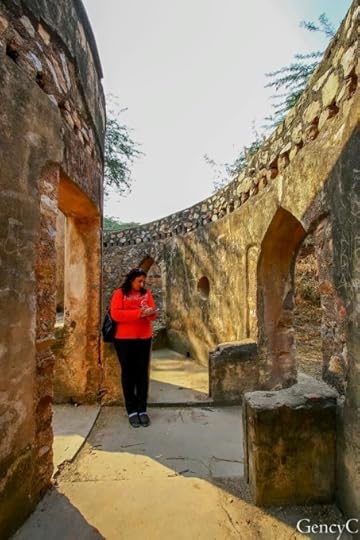
#internationawomensday
The post Should I follow my dreams? appeared first on Monica Bhide | Recipes, Stories, Inspiration.



